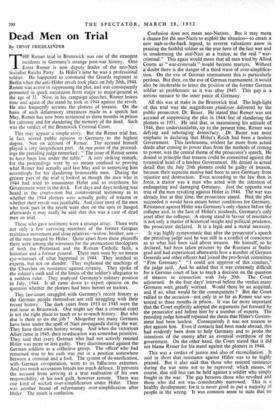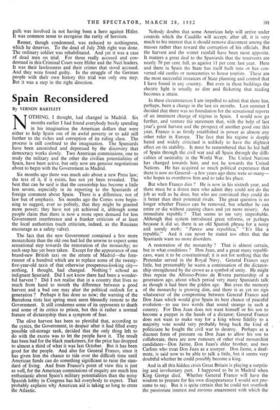Dead Men on Trial
By ERNSTFRIEDLAENDER
This may appear a simple story. But the Remer trial has, in fact, stirred public opinion in Germany to the highest degree. Not on account of Remer. The accused himself played a very insignificant part. At one point of the proceed- ings the presiding judge remarked : "The issue of Remer seems to have been lost under the table." A very striking remark, for the proceedings were by no means confined to proving what Remer had actually said last May and to sentencing him accordingly for his slandering honourable men. During the greater part of the trial it looked as though the men who in 1944 had tried to assassinate Hitler and to overthrow his Government were in the dock. For days and days nothing was heard in the court-room but controversial testimony as to whether the 1944 plotters were actually guilty of treason or whether their revolt was justifiable. And since most of the men who took part in the revolt were shot on the spot or hanged afterwards it may really be said that this was a case of dead men on trial.
Those who gave testimony were a strange array. There were not only a few surviving members of the former Geripan resistance movement and close relatives—widow, brother, son— of the men hanged by Hitler. Quite apart from these plaintiffs there were among the witnesses for the prosecution theologians of both the Protestant and the Roman Catholic faith, a historian and a former general. These men were by no means eye-witnesses of what happened in 1944. They testified as experts, but not on slander. They explained the teachings of the Churches on resistance against tyranny. They spoke of the soldier's oath and of the limits of the soldier's allegiance to a ruthless ruler. They analysed Germany's military position in July, 1944. It all came down to expert opinion on the question whether the plotters had been heroes or traitors.
This law-court struggled with Germany's recent history as the German people themselves are still struggling with their recent history. The dark years from 1933 to 1945 were the real issue at Brunswick. One might say that a criminal court is not the right place to teach or to re-teach history. But who else is there to do the job ? Altogether too many Germans have been under the spell of Nazi propaganda during the war. They have their own history wrong. And when the victorious Allies came in 1945, their re-education was somewhat primitive. They said that every German who had not actively resisted Hitler was more or less guilty. They discriminated against the German soldiers as a collective group. The officer- who had remained true to his oath was put in a position somewhere between a criminal and a fool. The system of de-nazification, with German co-operation, went to its fallacious extremes. .And too much accusation breeds too much defence. It prevents the accused from arriving at a true realisation of his own responsibility, of his own guilt, however remote. There was one kind of wicked over-simplification under Hitler. There was another brand of reformatory over-simplification after Hitler. The result is confusion. Confusion does not mean neo-Nazism. But it may mean a chance for the neo-Nazis to exploit the situation—to create a new stab-in-the-back legend, to reverse valuations anew in praising the faithful soldier as the true hero of the last war and in condemning the anti-Nazi as a traitor, as the real "war- criminal." This again Would mean that all men tried by Allied Courts as " war-criminals " would become martyrs. Without a doubt there is the danger of a third wave of over-simplifica- tion. On the eve of German rearmament this is -particularly perilous. But then, on the eve of German rearmament:, it would also be intolerable to leave the position of the former German soldier as problematic as it was after 1945. This gap is a serious menace to the inner peace of Germany.
All this was at stake in the Brunswick trial. The high-light of this trial was the magnificent plaidoyer delivered by the public prosecutor, Dr. Bauer. He stated that Remer was not accused of suppressing the plot in 1944, but of slandering the plotters in 1951. He said that, in maintaining his attitude of 1944, then understandable, up to the present time, Remer was defying and sabotaging democracy. Dr. Bauer was most emphatic in declaring that Hitler's Reich had been a lawless Government. This lawlessness, evident far more from actual deeds after coming to power than from the methods of coming to power, was the central theme of the prosecutor's speech. He denied in principle that treason could be committed against the tyrannical head of a lawless Government. He denied in actual detail that the July 20th plotters could be guilty of treason, because their supreme motive had been to save Germany from injustice and destruction. Even according to the law then in force, a traitor was a man who acted with the intention of endangering and damaging Germany. Just the opposite was true of the men revolting against Hitler in 1944. The war was already lost at that time, the prosecutor stated. Had the plot succeeded it would have meant better conditions for Germany. Resistance against Hitler was Germany's only chance before the collapse and, in the face of Hitler's misdeeds, Germany's only asset after the collapse. A strong stand in favour of resistance is not only a matter of historical insight and political prudence, the prosecutor declared. It is a legal and a moral necessity.
It was highly symptomatic that after the prosecutor's speech the presiding judge said he was still in a conflict of conscience as to what had been said about treason. He himself, so he declared, had been taken prisoner by the Russians at Stalin- grad and had experienced afterwards how a number of German Generals and other officers had joined, the pro-Soviet committee "Free Germany." "I could not approve of this conduct," the judge said. And he added that it was extremely difficult for a German court of law to reach a decision on the question of treason in connection with July 20th. The Court adjourned. In the four days' interval before the verdict many Germans were greatly worried. Would there be an acquittal, and if so, what would be the consequences ? But the Court rallied to the occasion—not only in so far as Remer was sen- tenced to three months in prison. It was far more important that the Court explicitly adopted the arguments put forward by the prosecutor and before him by a number of experts. The presiding judge himself repeated the thesis that Hitler's Govern- ment had been lawless. Consequently it was not treason to plot against him. Even if contacts had been made abroad, this had evidently been done to help Germany and to probe the intentions of the enemy after an eventual overthrow of the• government. On the other hand, the Court stated that it did not blame Remer for his stand against the plotters in 1944.
This was a verdict of justice and also of reconciliation. It said in short that resistance against Hitler was to be highly praised. But it also said that those who resisted resistance during the war were not to be reproved; which means, of course, that still less can be held against a soldier who simply fought in the war. The gap between those who revolted and those who did not was considerably narrowed. This is a healthy development, for it is never good to put a majority of people in the wrong. It was common sense to state that no guilt was involved in not having been a hero against Hitler. It was common sense to recognise the rarity of heroism.
Remer, though condemned, was reduced to nothingness, which he deserves. To the dead of July 20th right was done. The ordinary soldier was rehabilitated. And yet it was a case of dead men on trial. For those really accused and con- demned in this Criminal Court were Hitler and the Nazi leaders. It was their lawlessness and their crimes that stood accused. And they were found guilty. In the struggle of the German people with their own history this trial was only one step. But it was a step in the right direction.



































 Previous page
Previous page